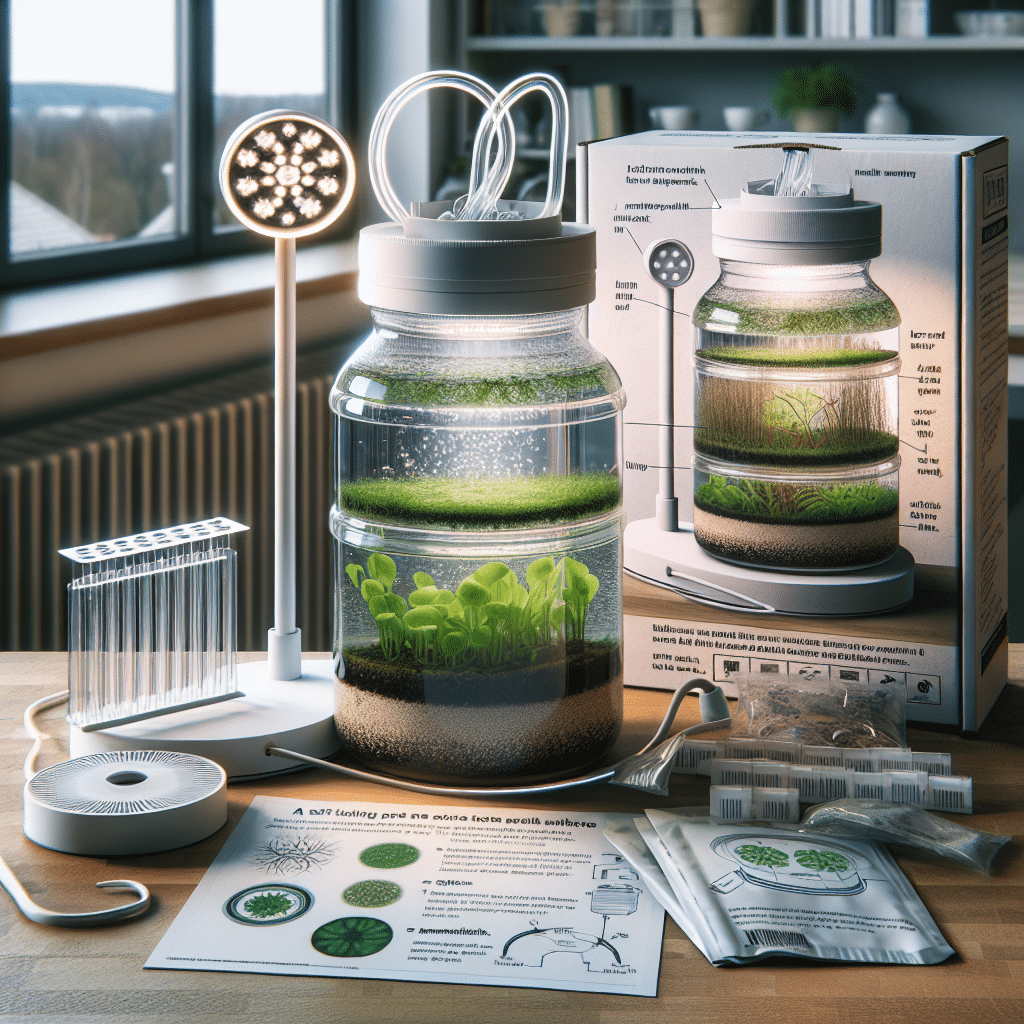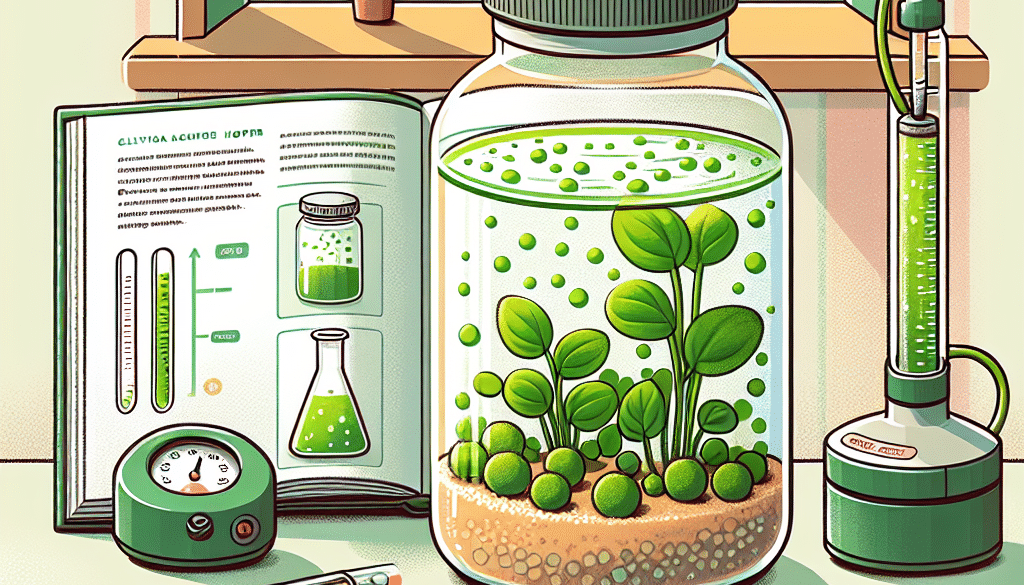Can l Grow Microalgae At Home?
-
Table of Contents
- Microalgae Cultivation at Home: A Sustainable Practice for the Future
- Understanding Microalgae and Their Benefits
- Is Home Cultivation of Microalgae Possible?
- Setting Up Your Home Microalgae Farm
- Choosing the Right Strain
- Equipment and Materials
- Creating the Perfect Environment
- Maintenance and Harvesting
- Challenges and Considerations
- Case Studies and Success Stories
- Conclusion: Embracing Microalgae Cultivation at Home
- Discover ETprotein’s High-Quality Protein Products
Microalgae Cultivation at Home: A Sustainable Practice for the Future

Microalgae, the tiny photosynthetic organisms found in both fresh and marine waters, have garnered significant attention due to their potential in biotechnology, biofuel production, and as a superfood. With growing interest in sustainable living and self-sufficiency, many people are curious about the feasibility of cultivating microalgae at home. This article explores the possibilities, benefits, and methods of growing microalgae in a domestic setting.
Understanding Microalgae and Their Benefits
Microalgae are a diverse group of unicellular organisms capable of performing photosynthesis. They are a crucial component of aquatic ecosystems and have a remarkable ability to convert carbon dioxide into oxygen. The benefits of microalgae are vast, ranging from environmental to nutritional. They can be used for:
- Carbon sequestration and oxygen production
- Production of biofuels as a renewable energy source
- Bioremediation to clean up polluted waters
- Production of high-value compounds such as antioxidants, pigments, and fatty acids
- As a nutrient-rich food supplement, offering proteins, vitamins, and minerals
Is Home Cultivation of Microalgae Possible?
Yes, it is entirely possible to grow microalgae at home. While commercial cultivation of microalgae occurs on a much larger scale, home-based systems can be set up with relative ease. The key to successful microalgae cultivation lies in creating the right environment for these organisms to thrive.
Setting Up Your Home Microalgae Farm
Starting a microalgae farm at home requires some basic equipment and understanding of the growth requirements of these organisms. Here’s what you need to know:
Choosing the Right Strain
There are thousands of microalgae species, but not all are suitable for home cultivation. Spirulina and Chlorella are two popular choices due to their nutritional value and ease of growth. Research the specific needs of the strain you choose to ensure optimal growth conditions.
Equipment and Materials
To grow microalgae at home, you will need:
- A transparent container or tank to allow light penetration
- A source of light, preferably sunlight or artificial grow lights
- A nutrient medium containing the necessary minerals and salts
- An air pump to circulate the medium and provide carbon dioxide
- pH, temperature, and light sensors to monitor and maintain optimal conditions
Creating the Perfect Environment
Microalgae require specific conditions to grow effectively:
- Temperature: Most microalgae strains prefer temperatures between 20-30°C (68-86°F).
- pH: A pH level of around 8-9 is ideal for strains like Spirulina.
- Light: Adequate light is essential for photosynthesis. Ensure your setup receives plenty of light for at least 12 hours a day.
- Nutrients: A balanced mix of nitrates, phosphates, and other minerals is crucial for growth.
Maintenance and Harvesting
Regular monitoring and maintenance are required to keep your microalgae healthy. This includes checking pH levels, temperature, and nutrient concentrations. Harvesting can be done by filtering the microalgae from the medium, washing, and then drying for consumption or storage.
Challenges and Considerations
While growing microalgae at home is feasible, there are challenges to consider:
- Contamination: Unwanted organisms can invade your culture, so maintaining cleanliness is crucial.
- Optimization: Finding the right balance of light, temperature, and nutrients can take time and adjustment.
- Space: Depending on your goals, you may need a significant amount of space to grow enough microalgae for personal use.
Case Studies and Success Stories
Many enthusiasts have successfully grown microalgae at home. Online forums and communities share success stories of individuals producing Spirulina and Chlorella for personal consumption, showcasing the potential of home cultivation.
Conclusion: Embracing Microalgae Cultivation at Home
Home cultivation of microalgae is not only possible but also a rewarding endeavor that contributes to sustainability and personal health. With the right setup and care, anyone can grow these powerful organisms at home, reaping the environmental and nutritional benefits they offer.
Discover ETprotein’s High-Quality Protein Products
If you’re interested in the nutritional benefits of microalgae but aren’t ready to start your own cultivation, ETprotein offers a range of high-quality protein products that can complement your diet. Their offerings include organic plant-based proteins and L-(+)-Ergothioneine, which are perfect for those seeking sustainable and health-conscious alternatives to traditional protein sources.
About ETprotein:
ETprotein, a reputable protein and L-(+)-Ergothioneine (EGT) Chinese factory manufacturer and supplier, is renowned for producing, stocking, exporting, and delivering the highest quality organic bulk vegan proteins and L-(+)-Ergothioneine. They include Organic rice protein, clear rice protein, pea protein, clear pea protein, watermelon seed protein, pumpkin seed protein, sunflower seed protein, mung bean protein, peanut protein, and L-(+)-Ergothioneine EGT Pharmaceutical grade, L-(+)-Ergothioneine EGT food grade, L-(+)-Ergothioneine EGT cosmetic grade, L-(+)-Ergothioneine EGT reference grade and L-(+)-Ergothioneine EGT standard. Their offerings, characterized by a neutral taste, non-GMO, allergen-free attributes, with L-(+)-Ergothioneine purity over 98%, 99%, cater to a diverse range of industries. They serve nutraceutical, pharmaceutical, cosmeceutical, veterinary, as well as food and beverage finished product distributors, traders, and manufacturers across Europe, USA, Canada, Australia, Thailand, Japan, Korea, Brazil, and Chile, among others.
ETprotein specialization includes exporting and delivering tailor-made protein powder and finished nutritional supplements. Their extensive product range covers sectors like Food and Beverage, Sports Nutrition, Weight Management, Dietary Supplements, Health and Wellness Products, and Infant Formula, ensuring comprehensive solutions to meet all your protein needs.
As a trusted company by leading global food and beverage brands and Fortune 500 companies, ETprotein reinforces China’s reputation in the global arena. For more information or to sample their products, please contact them and email sales(at)ETprotein.com today.












